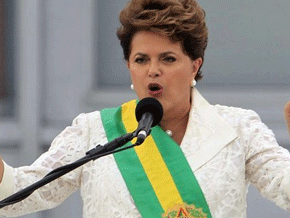2011 ends and the gay community, when it comes to political gains, has little to celebrate. This year could be marked by one in which religious fundamentalism ruled the National Congress and the Presidency of the Republic, represented by Dilma Rousseff.
As soon as she took office, the president announced the new ministers. The most eagerly awaited name was for the Special Secretariat for Human Rights, which during the Lula government had been commanded by Paulo Vanucchi. The portfolio would be taken over by elected federal deputy Maria do Rosário (PT-RS), who as a parliamentarian already had work linked to youth and LGBT.
But in the month of May, the gay community would face the biggest setback in recent political history. When the federal government, trying to save the Minister of the Civil House, Antonio Palocci, who was the target of several complaints, brought down the School Without Homophobia Kit, in the face of blackmail led by Anthony Garotinho (PRB-RJ) and Jair Bolsonaro (PP-RJ), that if he did not veto the material, they would summon Palocci to testify. The material fell and so did the minister.
In a speech, President Dilma Rousseff, who admitted that she had not watched the videos, just one of them, declared that in her government the "propaganda of any sexual option (sic)" would not be allowed, but that her government is in favor of the "struggle against homophobia". The president also said that the material would be reviewed and modified. However, so far nothing has happened.
If in Congress and the Executive we would suffer defeat, it would be the turn of the Federal Supreme Court (STF) to grant, in a historic and unanimous decision, the main victory, if not the only one, to the gay community at the same time. extend stable civil unions to same-sex couples. The project's rapporteur, Minister Carlos Ayres Britto, in a masterful defense, reiterated that the country's laws must follow the Constitution and not be guided by religion.
At the congress, the fundamentalist group advanced in the fight against everything related to gay rights, this influence spread throughout Brazil. The most clumsy example was when the São Paulo City Council approved Heterosexual Pride Day, authored by fundamentalist councilor Carlos Apolinário (DEM-SP), which was vetoed by mayor Gilberto Kassab. However, Chambers throughout Brazil presented similar projects and even the National Congress has a project of the same type waiting to be voted on.
Another theme that also permeated the national scene, once again, was PLC 122/2006, which aims to make homophobia a crime throughout the national territory. At the beginning of the legislative year, senator Marta Suplicy (PT-SP) got signatures to unarchive the project and assume its rapporteurship.
From then on, there was a whole controversy: first the Civil House office asked the senator to sit down with the evangelical bench and negotiate the new text. Even so, and with part of the social movement against the replacement, the senator was unable to gain support and had to withdraw the bill from the vote. two times.



